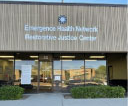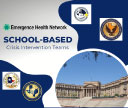Community Impact
The EHN team has worked hard to design and launch programming that will develop innovative programming that would greatly impact the community we serve. Below are just a few of the clinical offerings that showcase the quality services offered by Emergence Health Network.
(Click icons below for more information.)
What distinguishes our program is its integration within Emergence Health Network, allowing us to serve clients under the General Revenue Program (GR) who are not enrolled in HCS or TXHML. By working to bridge this gap, EHN provides critical support to individuals who might otherwise face delays due to waiver program waitlists, ensuring no one is left without the resources they need to thrive. One of our most inspiring success stories involves a female GR client who faced significant social challenges after graduating from school. Since joining our program, she has made remarkable strides, including shopping independently with minimal supervision. Her growing social confidence and enthusiasm for developing new skills highlight the transformative impact of our services, reflecting our commitment to fostering meaningful, positive changes in our clients' lives.
The School-Based program operates by placing caseworkers, therapists, peer support specialists, and other qualified mental health professionals on school campuses. Students are referred to SBMH staff via school counselors. Parents of students in services can additionally benefit from this opportunity by also receiving access to resources and supports from EHN. In the 2023-2024 academic year, SBMH staff were able to offer services to 268 youth across all campuses.
Mental Health First Aid is an eight-hour, and gives people key skills to help someone who is developing a mental health problem or experiencing a mental health crisis. Just as CPR raining helps a layperson without medical training assist an individual following a heart attack, MHFA helps a layperson assist someone experiencing a mental health crisis. Studies have found that those who trained in Mental Health First Aid have greater confidence in providing help to others and greater likelihood of advising people to seek professional help.
Emergence trainers have provided MHFA courses to law enforcement, clergy, educators, and many other professionals and advocates. Youth Mental Health First Aid has helped area educators and child-serving agencies, and Veterans MHFA has provided support to military service members and those who helped them.
Emergence Health Network (EHN) has worked effectively with its law enforcement partners to ensure the safety of both peace officers and members of the public through the use of El Paso’s Crisis Intervention Team (CIT) model. EHN works collectively with law enforcement agencies to respond and assist on 9-1-1 mental health crisis calls and ensure residents receive appropriate response to their behavioral health concern.
Since its implementation in 2019 by Emergence Health Network and the El Paso Police Department, the crisis intervention team co-deployment model has successfully expanded into other local community law enforcement entities, including the El Paso County Sheriff's Office and the Socorro, Texas, Police Department. In August of 2022, a school-based crisis intervention team initiative was launched in partnership between Emergence Health Network and El Paso Independent School District, the largest school district in El Paso County, with 83 campuses serving approximately 60,000 students. In January 2023, Emergence Health Network expanded its school-based crisis intervention services with the Canutillo Independent School District, with ten schools that serve approximately 6,000 students. . The innovation of the school-based model has placed El Paso at the forefront of crisis service design on a state and national platform.
In FY24, the Local EHN Crisis Hotline (915-779-1800) call takers answered 15,634 calls, reflecting its critical role in providing immediate support to individuals facing mental health crises. Additionally, EHN’s team received 9,830 calls from the National Suicide and Prevention Lifeline (NSPL 988), ensuring a seamless local response for those reaching out through this national resource.
In 2024, Emergence Health Network harnessed the power of social media to communicate important information and raise awareness about various topics related to enhancing the mental health and well-being of our community. Explore the links to see EHN in Action!
EHN Highlights
Emergence Health Network is proud to showcase some of its achievements in 2024, reflecting our commitment to improving the lives of our residents and employees. From raising educational awareness to enhancing direct care services for our clients, and introducing cutting-edge technology to boost employee efficiency, EHN’s success both at the front lines and in support services, demonstrates our dedication to our community’s well-being.

EHN implemented the Bells Artificial Intelligence Program, which uses AI to enhance data-driven decision making, suggesting clinical language and other innovations that cuts documentation time for clinicians.

EHN opened its Restorative Justice Center in east-central El Paso to house programming for justice-involved individuals.

EHN received funding from El Paso County and HHS for the launch of a Diversion Center that will provide short-term intervention for justice-involved individuals to be co-located at EHN’s Extended Observation Unit.

EHN coordinated an IDD Town Hall, where State Representative Joe Moody and several family members spoke about the importance of additional funding for IDD services in Texas.

EHN, in partnership with KVIA-TV received the 2024 Texas Council Frank M. Adams Award for our awareness efforts related to behavioral health and substance misuse concerns in our El Paso community.

In 2024 EHN expanded its school-based Crisis Intervention Teams to now include four districts which are Canutillo, El Paso, Fabens and Socorro ISD’s
Making Lives Better
Community Investments
$18.8 million
In 2024, Emergence Health Network focused on obtaining millions of dollars in funding through state and federal grants. The successful efforts has enabled EHN to enhance services and introduce new programs aimed at improving the behavioral health of our community and create job opportunities for local residents.
EHN received HHSC funding for the Supporting Mental Health and Resiliency in Texas (SMART) grant which allows EHN to expand its school-based mental health programs by offering more behavioral health services along with training and an outreach awareness campaigns to educate students, families and the school staff on a variety of behavioral health topics specific to youth.
Diversion Center $3.1 million
The newly established Diversion Center, provided through funding from the County of El Paso and HHSC will operate 24/7 as a recovery-focused, short-stay alternative to incarceration, offering use by law enforcement and eligible entities. Embedded within the EHN Diversion Center is the sobering unit, which is a dedicated space for individuals under the influence of alcohol who require sobering.
First Responders Comprehensive Action and Recovery Act
The Substance Abuse and Mental Health Services Administration (SAMHSA) provided EHN and its Community Training Academy more than 3 million dollars to providing training and Naloxone to area first responders and other direct services providers to assist the community with an increase of overdose reversal services.
The Healthy Transitions SAMHSA grant provides EHN with funding to create a “clubhouse model” to address service gaps for clients transitioning from youth to adult behavioral health services.
Outreach
EHN was awarded a $1.75 million dollar grant from the Health and Human Services Commission (HHSC) for the expansion of its Youth Crisis Outreach Teams (YCOT.) EHN will provide crisis support 24 hours for 7 days a week to children and youth between the ages of 3 to 17 with the intention of deescalating crisis situations and diversion.
Inspire Court Program
The Inspire Court program focuses on ensuring individuals with both a felony conviction and a mental health condition receive appropriate mental health treatment. As the Local Mental Health Authority, EHN will collaborate with other local agencies such as the courts and probation services to prevent recidivism.
Community Mental Health Initiative
Forensic Assertive Community Treatment
$3.89
Million
The purpose of the CMHI grant awarded by SAMHSA, is to expand and enhance school-based and community-based services offered for children, young adults, and their family members with or who are at risk of serious emotional disturbance.
$500K
Through the Office of the Governor of Texas, EHN was awarded 500-thousand dollars for the incorporation of the Forensic Assertive Community Treatment (FACT) program which tasks EHN with improving its clients’ mental health outcomes and daily functioning by addressing criminogenic risks and needs while diverting individuals in need of treatment away from the criminal justice system.